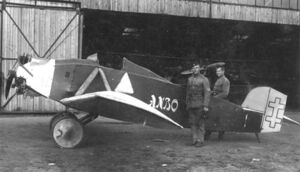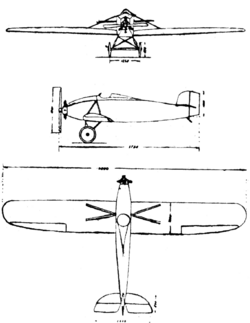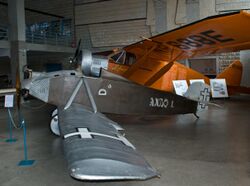Engineering:ANBO I
From HandWiki
| ANBO I | |
|---|---|

| |
| Role | Prototype trainer aircraft |
| Manufacturer | Karo Aviacijos Tiekimo Skyrius |
| Designer | Antanas Gustaitis |
| First flight | 14 July 1925 |
| Retired | 1935 |
| Number built | 1 |
| Developed into | ANBO II |
The ANBO I was a single-seat aircraft developed in Lithuania, proposed as a trainer for the Army It was a low-wing, braced monoplane of conventional tailwheel configuration. The fuselage structure was of fabric-covered welded steel tube, The wing had a wooden, two-spar structure and was fabric covered but the fuselage, also fabric covered, had a welded steel tube structure.[1]
The first flight took place in 1925. Ten years later the aircraft was sold to Lithuanian Aviation Museum in Kaunas where it is exhibited today.[2][3]
Operators
 Lithuania
Lithuania
Specifications


Data from Les Ailes, November 1925[1]
General characteristics
- Crew: One
- Length: 5.75 m (18 ft 10 in)
- Wingspan: 10 m (32 ft 10 in)
- Height: 1.95 m (6 ft 5 in)
- Wing area: 11.40 m2 (122.7 sq ft)
- Empty weight: 190 kg (419 lb) equipped
- Gross weight: 300 kg (661 lb)
- Fuel capacity: 35 kg (77 lb) fuel and oil
- Powerplant: 1 × Anzani 3-cylinder radial, 30 kW (40 hp)
- Propellers: 2-bladed Dorand, 1.90 m (6 ft 3 in) diameter
Performance
- Maximum speed: 142 km/h (88 mph, 77 kn) at ground level
- Endurance: 4 hr
- Service ceiling: 4,200 m (13,800 ft)
- Time to altitude: 7 min to 1,000 m (3,300 ft)
- Take-off distance: 30 m (98 ft)
- Landing distance: 40 m (130 ft)
References
- ↑ 1.0 1.1 Serryer, J. (5 November 1925). "Le monoplan A.Gustaitis". Les Ailes (229): 2–3. http://gallica.bnf.fr/ark:/12148/bpt6k6568261x/f2.
- ↑ "Latvian Air Force Museum, - ANBO I". http://www.lam.lt/old/istorija/karo_aviacija/gustaicio/anbo1/nfra1en.htm.
- ↑ Ogden, Bob (2009). Aviation Museums and Collections of Mainland Europe. Air Britain (Historians) Ltd. p. 357. ISBN 978-0-85130-418-2.
Further reading
- Taylor, Michael J. H. (1989). Jane's Encyclopedia of Aviation. London: Studio Editions.
 |
